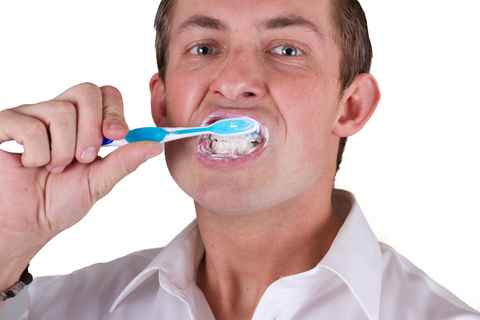Is periodontal disease contagious?
September 5th, 2018

According to the Centers for Disease Control and Prevention, half of adults age 30 and over suffer from some form of gum disease. Caused by plaque buildup, gum disease is an infection of the tissue that surrounds and supports the teeth. In its advanced stages, it is known as periodontal disease. If left untreated, it can result in the loss of tissue and bone that support the teeth, causing teeth loss. It’s a preventable condition seen far too often by Drs. Rottschalk, Acker, and Froidcoeur.
Research between periodontal disease and other diseases is ongoing. Some studies have indicated that gum disease is linked to other health conditions such as stroke or diabetes. Furthermore, while most factors that lead to periodontal disease are dependent on the individual (genetics, diet, poor oral hygiene) there is a possibility that periodontitis is capable of spreading from one person to another.
What the Research Says
Periodontitis is a gum infection, and the bacteria that cause the gums to become infected travels in saliva. Researches have used DNA coding techniques to track the path of infection from one person to another. In other words, kissing and close contact play a role in the transmission of the infection, so if you’re married to a spouse with periodontal disease, then your chances of having gum problems are slightly increased. Other studies have indicated that saliva contact is common in family settings through coughing, sneezing, and shared utensils and food. Children with parents who have periodontal disease are at a somewhat higher risk of developing it. At the same time, just because you exchange bacteria with your loved ones doesn’t mean you will get periodontal disease.
It is important to note that the scientific evidence supporting the spread of periodontal disease is limited and ongoing. The best way to prevent gum disease is through proper plaque control, which includes brushing, flossing, mouthwash, and twice a year trips for professional cleanings. Contact our Fairview Heights, IL office if you have any questions about periodontal disease.
Tooth Discoloration: Common causes and what you can do to stop it
September 5th, 2018

Looking back at childhood photos, you may notice picture after picture of yourself with a mouthful of shiny white teeth. When you look in the mirror today, you wonder what happened to that beautiful smile. Many adults struggle with tooth discoloration and find it embarrassing to show off their teeth in a smile. Once you identify the cause of your tooth discoloration, there are treatment options at Dr. John Rottschalk Dental Group that can restore your teeth and your confidence.
What Causes Tooth Discoloration?
There are a host of factors that may cause your teeth to discolor. Some are directly under your control, and others may not be preventable. Here is a list of common reasons that teeth become discolored.
- Genetics: Much of your dental health is determined by genetic factors beyond your control. Some people naturally have thinner enamel or discolored teeth.
- Medications: Several medications lead to tooth discoloration as a side effect. If you received the common antibiotics doxycycline or tetracycline as a child, your teeth may have discolored as a consequence. Antihistamines, high blood pressure medications, and antipsychotic drugs can also discolor teeth. If you think a medication may be leading to tooth discoloration, talk to Drs. Rottschalk, Acker, and Froidcoeur. Never discontinue the use of a medication without consulting your doctor, however.
- Medical Conditions: Genetic conditions such as amelogenesis or dentinogenesis cause improper development of the enamel, and can lead to yellowed, discolored teeth.
- Poor Dental Hygiene: Failing to brush your teeth at least twice a day or regularly floss may lead to tooth decay and discoloration.
- Foods and Tobacco: Consumption of certain foods, including coffee, tea, wine, soda, apples, or potatoes, can cause tooth discoloration. Tobacco use also causes teeth to turn yellow or brown.
Treatments for Tooth Discoloration
There are a variety of treatments available to individuals with discolored teeth. One of the easiest ways to reduce tooth discoloration is through prevention. Avoid drinking red wine, soda, or coffee and stop using tobacco products. If you drink beverages that tend to leave stains, brush your teeth immediately or swish with water to reduce staining.
After determining the cause of tooth discoloration, Drs. Rottschalk, Acker, and Froidcoeur can suggest other treatment options. Over-the-counter whitening agents might help, but in-office whitening treatments provided at our Fairview Heights, IL office would be more effective. When whitening agents do not help, bondings or veneers are among the alternative solutions for tooth discoloration.
If you are worried about your teeth becoming yellow or brown, think carefully about your diet and medication use. Talk to Drs. Rottschalk, Acker, and Froidcoeur to identify substances that may be causing the problem. After treatment for tooth discoloration, you will have a beautiful white smile you can be proud to show off.
Ask Us about These Dental Treatments
August 29th, 2018

There are a few dental treatments that Drs. Rottschalk, Acker, and Froidcoeur and our team recommend for all patients to get if they wish to protect their oral health. Sometimes it’s hard for patients to decide which treatment plan would be best for their teeth. Learn about these three must-have treatments and how they can help protect your teeth in various ways.
Professional Cleanings
First, get a professional dental cleaning every six months. Regular cleanings can protect you from potential gum disease because they enable us to catch it early.
Cleanings also will get rid of plaque and tartar that have collected on your teeth over time. Oral health has been linked to your body’s overall health. We recommend scheduling your appointments in advance: Feel free to contact our practice’s Fairview Heights, IL location if you forget when you scheduled your next visit. Our staff will be happy to assist you.
Periodontal Exams
We also recommend that all our patients at Dr. John Rottschalk Dental Group receive a complete periodontal exam each year. You can ask about this during your regular, scheduled cleanings.
It’s a quick and painless procedure in which our hygienist probes each tooth to make sure the bone and soft tissue are healthy. If there’s a sign of infection, we will be able to treat it effectively before painful symptoms kick in.
Many adult patients are unaware that they have periodontal disease, and they may suffer the loss of a tooth if it goes untreated. Make sure you schedule a periodontal exam each year and save yourself a lot of time and pain.
Sealants
We also recommend dental sealants, particularly to protect your molars. Many people assume this treatment is just for kids to prevent cavities, but it can be used for adults too!
Sealants provide a protective barrier on your teeth that can help block against the buildup of plaque in those hard-to-reach areas in the back of your mouth. If you received sealants as a child, chances are they’ve worn off over time.
So if you want to save dental costs over the long haul, we recommend getting sealants again for cavity protection.
Drs. Rottschalk, Acker, and Froidcoeur and our team hope you take our advice when it comes to your oral hygiene and schedule regular appointments for your dental cleanings. We look forward to seeing you at your next appointment!
I don't brush while I'm at work. Should I?
August 22nd, 2018

Yes, absolutely. A recent survey by Oral-B® reveals that despite knowing that a healthy, good-looking smile affects not only their personal wellness but their professional image as well, very few people (only 14 percent) brush and floss at the office regularly. What’s more, three quarters of people who responded to the survey said they ate twice or more a day at work.
Today, Drs. Rottschalk, Acker, and Froidcoeur and our team thought we would provide some tips for brushing at work.
- Leave a toothbrush at work to increase your likelihood of brushing
- Brush your teeth twice a day with fluoride toothpaste. Replace your toothbrush every three or four months, or sooner if the bristles are frayed. A worn toothbrush won’t do a good job of cleaning your teeth.
- Clean between teeth daily with floss or an interdental cleaner; this helps remove plaque and food particles from between the teeth and under the gum line. Tooth decay-causing bacteria still linger between teeth where your toothbrush bristles can’t reach.
And remember to brush for 30 to 45 seconds across visible parts of the teeth. Brushing after breakfast or lunch will eliminate any remaining food particles and odors. We recommend people brush their teeth twice and floss once a day to remove plaque and other harmful bacteria.
To schedule your next appointment with Drs. Rottschalk, Acker, and Froidcoeur at our Fairview Heights, IL office, please give us a call!





